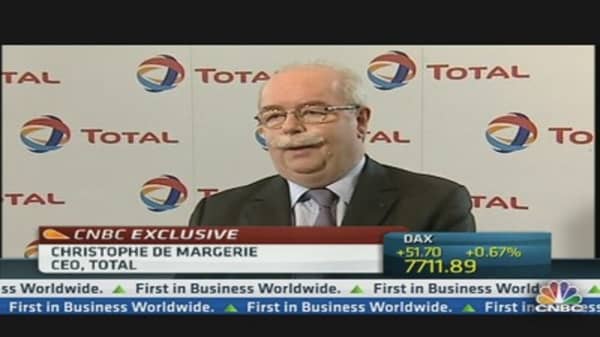The days of lofty oil prices are numbered and the price of Brent Crude oil is set to fall 30 percent to $80 per barrel by the end of the year, according to Robert Levitt, CEO and founder of U.S. wealth manager Levitt Capital Management.
Levitt says that increased supply of U.S. shale oil combined with the resolution of transportation issues should ease upward pressure on oil prices.
(Read More: Union Pacific Rides the Shale Boom: Exec)
A study by PricewaterhouseCoopers (PwC) released on Friday meanwhile predicted that the global boom in shale oil production will shave up to 40 percent off oil prices by 2035 and boost global gross domestic product by 3.7 percent over the same period.
Shale oil - also known as kerogen oil - is an unconventional form of oil extracted from shale rock formations, only made possible in recent years through technological breakthroughs.
According to Levitt, the impact of increased shale oil supply has been drastically underestimated by markets.
"Oil prices are coming down and we could see them as low as $80 by the end of the year. This will not be because of an economic collapse like we saw in 2008, but because there is so much shale oil coming out of the U.S. and this phenomenon is not well understood," he told CNBC's Asia's "Squawk Box" on Thursday.
(Read More:
"We are going to see 300,000 barrels a day going from the North Sea to South Korea in 2013, and this is bearing in mind we didn't see any barrels prior 2011," added Levitt.
Between 2004 and 2011, the U.S. shale oil market grew at a rate of 26 percent per year, according to PwC. Growth is now expected to slow slightly, but the study estimated global production of shale oil will still contribute 14 million barrels per day towards global oil supply by 2035, roughly 12 percent of today's total global supply.
Another factor which will contribute to the reduction in the oil price will be the resolution of transportation issues, which will reduce U.S. imports of oil by the end of the year, said Levitt.
Increased U.S. oil production has put pressure on pipelines, which lack sufficient capacity to move the excess oil around. As a result refineries on the East Coast and California have had to continue to import oil from other countries.
Levitt said the U.S. infrastructure network is improving, helping to alleviate transportation concerns in the oil sector.
"Once we have all these issues straightened out. The price of oil is going to come down and that will be a great boom for the global economy," said Levitt.




